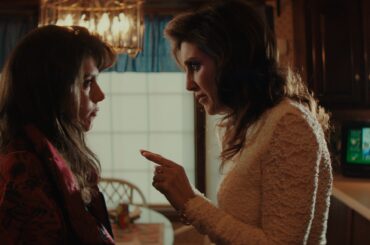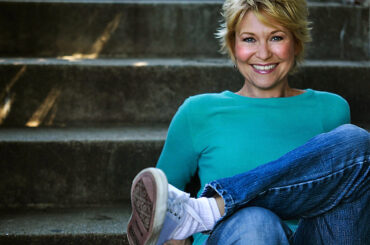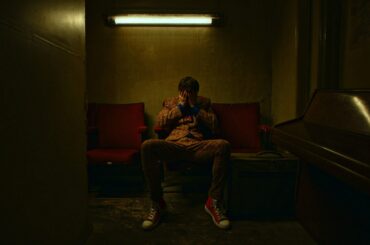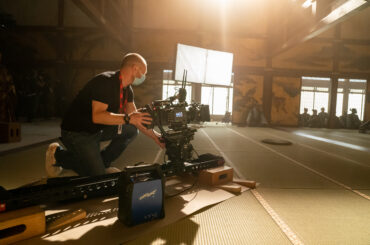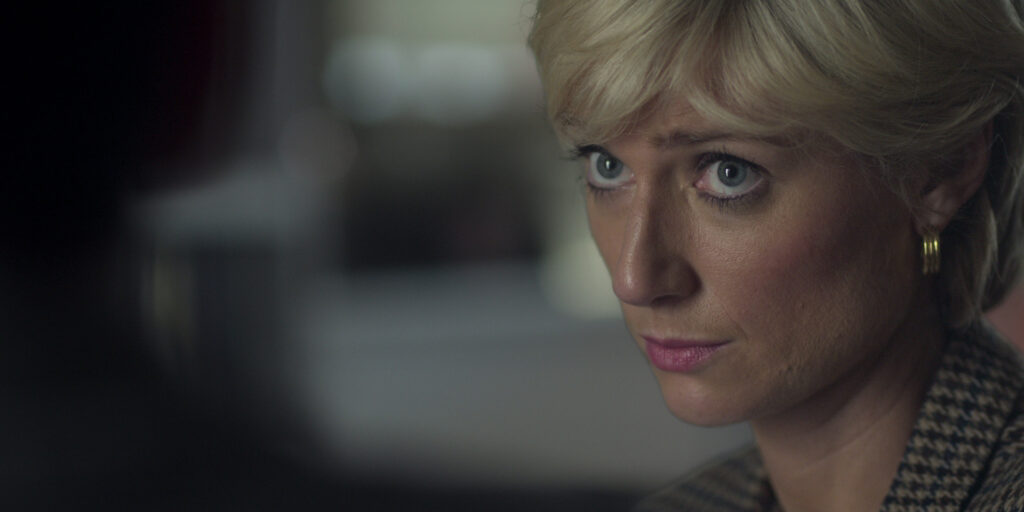
The Crown finished its triumphant run in late 2023 with a universally praised final season. The creative success was achieved in no small part to its expert editors, Simon Brasse and Daniel Greenway. Each edited several episodes throughout its run.
Under the knowing eyes of creator and showrunner Peter Morgan, and with a whole team of some of the best film professionals that England has to offer. They had the wind on their backs of the successful previous seasons but with the challenge of the most present-day scenarios and the weight of concluding an extremely popular series that had high streaming numbers globally.
For season 6: Brasse edited episode 3, Dis-Moi Oui and episode 5, Willsmania and Greenway edited the series finale, Sleep, Dearie Sleep. They both recently spoke to Immersive together and shared some fascinating details of this task and honor.
[The following conversation has been edited for clarity and length.]
You’ve both been working on The Crown for more than a few seasons now, so can you both tell me about how you initially got involved with the show?
Simon Brasse: The initial connect… It’s wonderful how our freelance lives tangle. I’d done a job for Leftbank called Strike Back, which is way more famous in America than in England. I didn’t know much about it, but anyway, Leftbank made The Crown. I’d done a good enough job on that for them to sort of have me on their radar. And then when season three came along, they had a couple of new directors. I don’t think there was room for me there, but Christian (Schwochow) who was one of their new directors needed someone and they put me in touch with him and we just clicked. The first meeting just got on well, and that was it. Foot in the door.
Daniel Greenway: I came on in season three and then I did five and six. I mean, it was a dream because every day the rushes were just, the performances were incredible. The production design, the cinematography, the writing, everything was at such a high level, and we were lucky to work on a show like that. So yeah, it was just a real pleasure to work on.
How was the schedule?
DG: The edit period, they don’t rush it. They want, they treat it like a film. They call each episode a film. Let’s work on this film and that goes right through so you have time, you can try things out. They want you to collaborate. They value your opinions. I mean everybody involved, all the heads of departments are expected to give their opinions, chip in, really be part of the process, and then they build in time for reshoots. So you get to be part of that conversation as well. And they just really want to make something that is the best it can be, which is just a bit unusual in television to get that level of craft and that level of ambition.
What sort of prep did you guys do other than just culling through footage, considering the historical nature of the show?
SB: Every film was accompanied by a hundred-plus page document of source material, which was videos and photography and news clippings and quotes all combined into a beautifully presented PDF, which was, I mean, just a beautiful document to behold, which went sort of seen by scene chronologically through the film and we used that as our resource.
It was so in-depth and so well put together that we had references at our fingertips at any time for most of the set piece scenes for when The Crown isn’t doing what it’s unique buzzword of lifting the curtain on those private conversations. Where there was access to material and archive, we had it, and that’s across the board for any public engagement or documented meeting.
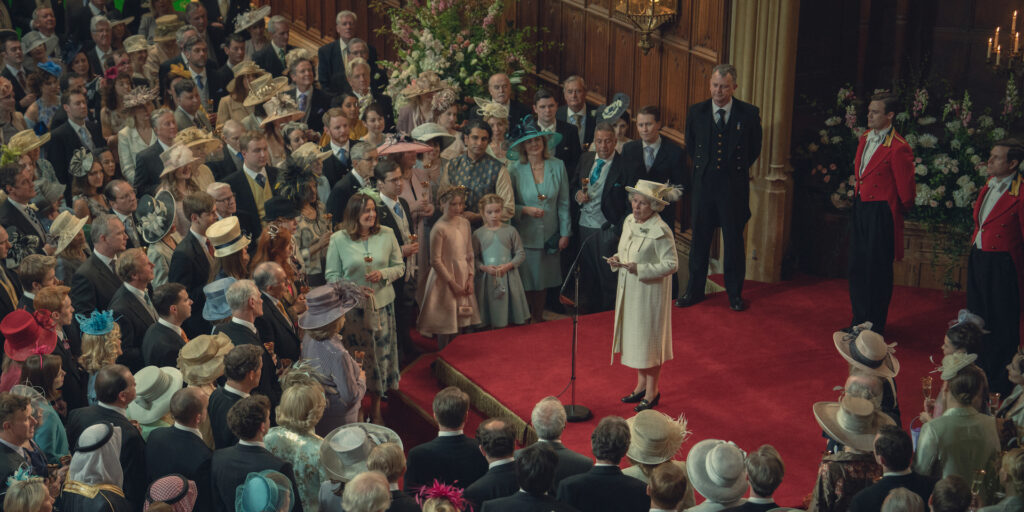
Any pressure when it got to the more personal bits? Did those scenes requite more delicacy?
SB: I didn’t feel any pressure until season six to myself above and beyond what we had already achieved as a team. And then, once we got into the more personal stories as the season wound down to its finale, there was a bit of, there was a few moments where I felt I want to be sensitive, and that was front and center in my thinking when constructing my edit.
I almost think to the point where it got in the way of telling a compelling, dramatic narrative, and part of our fine cut process was to go back and slightly reassess our approach from an editorial point of view and try not to be quite as observational as we had been. We had to find a balance between respectful but also engaging. There was never a moment though in that process where we lost sight of trying to be respectful and stick to what is considered to be the known facts.
DG: I mean it is fiction and we always approached the show as a drama, but I think that Simon’s right, that towards the end there was more pressure. These people are, they’re still in the public, Kate and William and Harry, are still very much part of the current popular culture discourse. There’s a lot of newspaper columns dedicated to them still. So this season six was the only time I heard Peter Morgan, the writer saying, “Coming in again, we’ve got to make sure that we are true to the spirit of these people and we are doing them justice.” We are.
Even though we don’t know what they said to each other, we know a lot of facts. Peter was very conscious of making sure that particularly the princes, we were doing them justice and it felt true and real and that came down to certain. It was even a look in a scene, a certain nuance which in the edit you can play with, Peter wanted to make sure that it felt true.
DG: I think that was always taken into consideration, especially with certain characters towards the end and with The Queen. I mean, she died while they were filming the early part of the final season. Peter, when he was writing episode 10, really wanted to pay tribute to her in that episode. He wanted to do it respectfully, that kind of look back at her legacy.
And so, that was approached from a very viewpoint of this needs to be dignified and respectful. I think we achieved that by the end, which I’m proud of. I think that the last sequence is really lovely, and also a lot of what he believes about the monarchy at the end there in that final scene.
Simon, how involved was Peter with your episodes? What creative conversations did you have?
SB: Peter is someone who respects the director’s space absolutely on set, pretty much lets ’em get on with it uninterrupted once he’s made his choices. He just lets him get on with it. But he’s very much a writer who wants to be in the edit, sees it as an opportunity to continue polishing his writing, and sees the shooting draft as not the final draft. Everyone knows that the edit can remake everything, but he does embrace that process.
He’s very knowledgeable about what could be done in the edit. He doesn’t want to wait until everything’s been shot because he feels like it’s a place where he can be safe and it’s his experimental zone, so he will watch it as it’s coming in and then rewrite as he sees performances and introduce new plots. I think it worked well. I think that’s a big part of how the show maintained its unique nature over 60 hours of episodes.
DG: Yeah, it makes a difference when you don’t have multiple opinions coming from lots of different execs and often they disagree or don’t know what the answers are. They have different ideas. To have someone who was the main person who was making, he was the main note giver. It’s a great team and everyone values each other’s opinions and it is just really collaborative.
Like Simon said, how he maintained that quality throughout having someone, a showrunner with that level of power, but also someone who’s so collaborative and he brings back people that he enjoys working with. So, we’ve all worked on this for many years, this show. So it was a lovely experience to always come back for another season.
Daniel, what was it like working with Stephen Daldry, who directed the last one. Since he started off with the show, how’d it come full circle for you both?
DG: Stephen Daldry was brilliant because he got me involved quite early on when they were still developing the script. He’s a lot like Peter. He’s very collaborative and there were big sequences that they were thinking about bringing back Olivia Coleman and Claire Foy.
And so, he wanted to discuss those with me as well, editorially, and also get my opinion on scripts. So he got me in early and it was a great process and a really lovely relationship. He trusted me to try lots of things out and was very open and he’s just a very, I mean he’s a very open person.
He likes everyone to chip in and help make something. It is just super collaborative. So it was a real pleasure. It all came together really well. There weren’t any often there, some major issues that needed fixing, and with the last episode we were worried, but it kind of all just came together in a really lovely way.
Tell us about the afterglow of The Crown. How fulfilled were you both by the response to the end?
SB: Everyone I speak to, certainly I’m not plugged into reception, to be honest with you. It’s just through networks and friends and colleagues, you just hear what people say and there’s always a buzz and excitement about it. It wasn’t unexpected, obviously The Queen was the age she was, but the fact that she did die in tandem with us filming that last season. I think that did give it even more poignancy. Everywhere you went during the process, there would be people who had a little anecdote of where they were.
For instance, during the summer of Diana’s death or where they were during Diana and Charles’s wedding and all of these momentous events that we managed to get into the drama did resonate across generations as well. That’s the other beauty of it. I think it’s got a real broad sweeping appeal. I felt just immense pride having been a part of it and maintaining its standards or being part of maintaining its standards from the moment I joined and until the end.
Daniel, what did you want to achieve with the ending of the series as well?
DG: I think one of the most powerful things about The Crown is it humanized The Queen and she was kind of this mysterious figure and for me, I came, having watched the early seasons and then actually getting involved in it, I came away feeling a lot of respect for her, how she worked incredibly hard, she dedicated her life. I think she was doing a great job as The Queen. Even people who aren’t royalists I think enjoyed the Crown because these people are humans. They’re part of a system which is not of their own making, so it makes for good drama and it’s got its downsides and a lot of people aren’t fans, but you come away thinking that she was an amazing woman.
In that final episode, we wanted that to come across and often the episodes aren’t centered around The Queen. There are lots of other characters. There are a lot of great periods in British history that are covered, which also was great. People learn a lot. I learned a lot about a lot of moments from British history through the show, but often the Queen isn’t the center. And in the last episode, we wanted this to be all about The Queen.
I mean, Imelda Staunton’s performance is incredible in that final episode and she often doesn’t get the chance to do that. There was a lot of emotion in her performance. We tried to hold onto her and enjoy her incredible performance in that final episode. For me, it was a real pleasure to be able to do her justice, because the show is ultimately about her.
The Crown Seasons 1-6 are all available to stream on Netflix.


